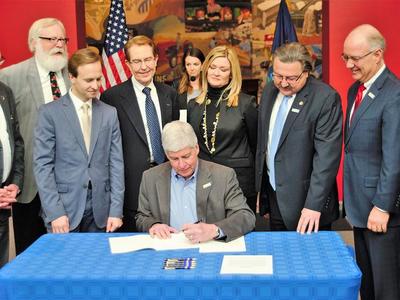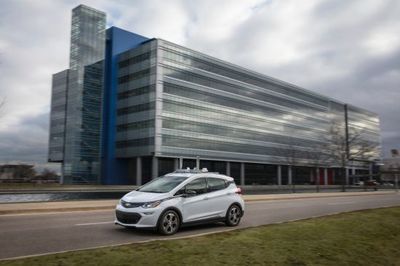Michigan In Slugfest With California - SAVE Act Spurs GM To Build and Test Autonomous Vehicles In Michigan
 Detroit Vs. Silicon Valley In Epic Battle |
LEARN MORE: Autonomous Vehicle News Library
LEARN MORE: Silicon Valley and Detroit Are In A Race To Create Our Driverless Future
TACH's TAKE: Silicon Valley On Its Way To Disrupt The Auto Industry And Replace Traditional Car Companies
TACH's TAKE: Autonomous Driving May Kill The Automobile Industry And Our Freedom Of Mobility
DETROIT December 15, 2016; On the heels of the signing of the SAVE Act legislation to support autonomous vehicle testing and deployment in Michigan, General Motors will immediately begin testing autonomous vehicles on public roads. GM also announced it will produce the next generation of its autonomous test vehicles at its Orion Township assembly plant beginning in early 2017.
“Revolutionizing transportation for our customers while improving safety on roads is the goal of our autonomous vehicle technology, and today’s announcement gets us one step closer to making this vision a reality,” said General Motors Chairman and CEO Mary Barra. “Our autonomous technology will be reliable and safe, as customers have come to expect from any of our vehicles.”
Testing is already underway on GM’s Technical Center campus in Warren, Michigan, and with the passage of the SAVE Act legislation will now expand to public roads on the facility’s outskirts. Within the next few months, testing will expand to metro Detroit, which will become GM’s main location for development of autonomous technology in winter climates.
Workers at the Orion Township assembly plant will build test fleet Bolt EVs equipped with fully autonomous technology. The plant currently manufactures the Chevrolet Bolt EV and Sonic. The new equipment will include LIDAR, cameras, sensors and other hardware designed to ensure system safety, leveraging GM’s proven manufacturing quality standards.
The test fleet vehicles will be used by GM engineers for continued testing and validation of GM’s autonomous technology already underway on public roads in San Francisco and Scottsdale, Arizona, as well as part of the Michigan testing fleet.
Since the beginning of 2016, GM has taken significant steps in its development of autonomous vehicle technology.
In January, the company announced the formation of a dedicated autonomous vehicle engineering team and a $500 million investment in Lyft to develop an integrated network of on-demand autonomous vehicles in the U.S. In March, the company announced the acquisition of Cruise Automation to provide deep software talent and rapid development expertise to help speed development.
In June, GM began testing autonomous Chevrolet Bolt EVs on the public roads in San Francisco and Scottsdale. The company has more than 40 autonomous vehicles testing in the two cities.
General Motors Co. and its partners produce vehicles in 30 countries, and the company has leadership positions in the world's largest and fastest-growing automotive markets. GM, its subsidiaries and joint venture entities sell vehicles under the Chevrolet, Cadillac, Baojun, Buick, GMC, Holden, Jiefang, Opel, Vauxhall and Wuling brands. More information on the company and its subsidiaries, including OnStar, a global leader in vehicle safety, security and information services, can be found at http://www.gm.com.
COMMENT:
Rebecca Lindland, senior analyst for Kelley Blue Book
As one of the world's largest manufacturers, GM needs to be at the forefront of autonomous vehicle development. They can leverage their global footprint to create products suited for different markets. The challenge is for consumers to believe one of the world's largest manufacturers can design and innovate such technology. Hopefully being early on road testing will convey that yes, they can and are innovating.”
 Michigan Gov. Snyder signs autonomous car bill while state legislators look on. (Photo: Gov. Scott's office) |
Excerpt From Fortune.Com
Michigan Gov. Rick Snyder signed a package of automaker-backed bills Friday that aim to clear the way for self-driving cars to operate on public roads and re-establish the state as the epicenter of automotive innovation in a time when much of the attention and praise has centered on Silicon Valley.The four bills, 995, 996, 997, and 998, establish regulations for the testing, use, and eventual sale of autonomous vehicle technology and are meant to more clearly define how self-driving vehicles can be legally used on public roadways. The new laws allow testing of vehicles without steering wheels, pedals, or needed human control--an important allowance that aims to propel Michigan ahead of California, a hotbed of driverless car development. (For instance, California rules prohibit the use of fully autonomous driverless cars that don't have a steering wheel or a brake pedal--like the prototype developed by Google.)
Automotive and technology companies will now be able operate self-driving vehicle ride-sharing services and driverless cars may be sold to the public once the technology has been tested and certified. One bill establishes the Michigan Council on Future Mobility, an arm of the Michigan Department of Transportation that will recommend policies to set industry standards. The council will regulate connected vehicle networks and how traffic data, such as vehicle crashes, will be collected and shared.
Fiat Chrysler Automobiles , Ford Motor Co., , Toyota Motor, Google and ride-hailing companies Uber and Lyft participated in shaping the final legislation, according to Michigan state officials.
However, tech companies like Uber are not happy with the contents of SB 996, which allows only “motor vehicle manufacturers” to participate in a so-called SAVE project. A SAVE project is an initiative that allows eligible automakers to deploy a network of on-demand self-driving taxis.
“We oppose SB 996 (the ‘SAVE Act’) and its anti-tech protectionist elements, but SB 995 helps resolve many of those issues, and we appreciate the state enacting those improvements,” an Uber spokeswoman said Friday. “Ultimately, we think it is early in the life of this technology to prescribe state laws, and while these bills may work for Michigan, we do not think they are something other states should use as a model.” The new laws come at an auspicious time for automakers and companies like and Uber who are racing against each other to develop and commercialize the technology.
"At the end of the day, the most important thing about SB 995 is that it will permit on-road deployment of autonomous vehicles. And we're grateful for this legislation because it will play a critical role in achieving our intention to deliver a fully autonomous SAE level 4-capable vehicle with no gas or brake pedals and no steering wheel for commercial use in geo-fenced areas in 2021,” Wayne Bahr, director Automotive Safety at Ford Motor Co. said at the signing Friday.
General Motors and other automakers developed the legislation and presented it to the Michigan Department of Transportation and Sen. Mike Kowall, who later introduced the bills in the state legislature, MDOT director Kirk Steudle told Fortune. Initially, companies including Google and Uber were dissatisfied with some language in the bill that appeared to prohibit their ability to operate an on-demand network of autonomous vehicles used by the public, Steudle said, adding that the language was modified and Google and Uber are comfortable that they can now qualify.
The big takeaway from these auto industry-backed bills--questionable language aside--is that it shows at least one major automaker is close enough to deploying a driverless taxi service in a limited area that it is already investing resources in enacting an explicit legal framework for that service, Smith said in an email exchange Thursday. “That’s exciting,” he added.



